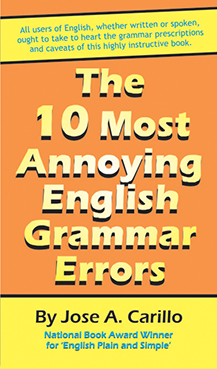 If you approach a snake-oil vendor, he will tell you, without a moment's hesitation, that something's wrong with you, and that you better take his medicine. A medical doctor, by contrast, after performing a battery of tests, not only will tell what ails you, but also explains what causes your ailment. Then he will recommend the best cure possible.
If you approach a snake-oil vendor, he will tell you, without a moment's hesitation, that something's wrong with you, and that you better take his medicine. A medical doctor, by contrast, after performing a battery of tests, not only will tell what ails you, but also explains what causes your ailment. Then he will recommend the best cure possible.Jose Carillo, the English-usage columnist of The Manila Times, is like the latter---he does not only point out the flaw(s) in a sentence, or in a paragraph, or in an entire composition, he explains as well how come it's wrong, and prescribes an antidote to avoid committing the same mistake again.
With a clinical eye of a doctor, Carillo diagnosed the recurrent---so recurrent that the author finds them annoying---grammar errors in his second English-usage book, "The 10 Most Annoying English Grammar Errors." (The first being "English Plain and Simple: No-Nonsense To Learn Today's Global Language"---which was given by the Manila Critics Circle a National Book Award.)
Carillo has been writing well for years, puncturing the grammar errors---flagrant and otherwise---that curiously get published or aired, considering the presence of editors. Sometime in the mid-2007, he said, a reader asked him to write about the 10 English grammar errors that he found most annoying. He agreed and gave an advance notice that he would do the writeups under the title "The 10 grammar errors I hate most."
But by the time he began writing the columns, he had changed the title. The reason is that he's "actually incapable of hating grammar mistakes." "After all," he said, "as an editing and writing consultant, I make a substantial part of my living straightening them out. Indeed, my feeling is more accurately that of discomfort, of annoyance in finding out that people you expect should know much, much better could be slipshod in their English. I therefore thought that the verb..."annoy," was more appropriate, so I decided to run my series of columns under the title "The 10 grammar errorst that annoy me most."
The result was the 20 columns that ran in The Manila Times. Written in a highly lucid prose, these columns tackled such grammar errors as (1) footloose modifiers---misplaced, dangling, and squinting; (2) mangled idiomatic expressions; (3) operative verb far detached from their subject; (4) subject-verb disagreement; (5) intransitive verb forced to act as transitive; (6) wrong pronoun usage; (7) misuse of participles; (8) misuse of prepositional phrases and prepositional idioms; (9) wrong use of basic verb-pairs; and (10) fused sentence.
By compiling these columns into a book, Carillo never intends to frighten the reader. But rather, as is his wont, he intends "to help English users in general avoide these errors in both their written and spoken English. I also trust that professional writers, editors, and publishers---whether in print, in the broadcast media, or on the web---will take to heart the grammar prescriptions and caveats taken up in this book, thus ensuring error-free English in their published work or broadcast statements."
Like Strunk and White's Elements of Style, "The 10 Most Annoying English Grammar Errors" is a slim volume, containing as it does 122 pages, including exercises at the end of every chapter that will "give English users ample practice in identifying and rooting out these types of errors in their own writing."
Like Strunk and White's Elements of Style, "The 10 Most Annoying English Grammar Errors" is as useful a book as ever. And you may do well to grab a copy of Carillo's book before you embark on using the language of Uncle Sam.
The 10 Most Annoying English Grammar Errors © 2008 by Jose A. Carillo. First printing, April 2008, Manila Times Publishing Corp.

By obtaining these content into an ebook, Carillo never plans to terrify the various readers. But rather, as is his will never, he plans "to help British customers in general avoide these mistakes in both their written and verbal British. I also believe in that freelance authors, marketers, and publishers---whether on the internet, in the transmitted press, or on the web---will take to heart the sentence structure medications and caveats taken up in this guide, thus guaranteeing error-free British in their released work or transmitted claims." Spybubble Gratis
ReplyDelete